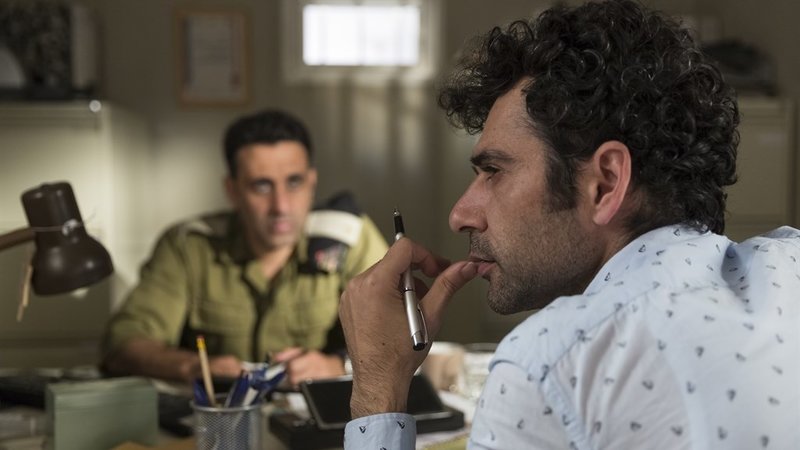Considering how potentially incendiary the title of Tel Aviv on Fire is, I was surprised at how slight, well-intentioned, and wholesomely funny this movie turned out to be. The film’s plot directly grapples with heavy topics – the Israel/Palestine conflict being front and center – but in terms of actual execution, the whole thing comes off more like a breezy comedy of errors.
Kais Nashif stars as Salam, a thirty-year-old, slightly meek Palestinian who lives in Jerusalem, but has to cross the border each morning to get to his job. He works on a Ramallah-produced soap opera called “Tel Aviv on Fire,” a melodramatic romance about a Palestinian spy who seduces an Israeli general in service of her people’s cause. Salam serves as the show’s Hebrew consultant. One day, when passing through the checkpoint, he asks one of the officers about whether or not one of the phrases in the script is actually accurate, and is promptly dragged in front of the Israeli commander, Assi, on suspicion of being a spy. Salam quickly manages to prove he’s actually in the entertainment business, and to boost is cred, he plays himself up as the main screenwriter. Unfortunately, this backfires, as the commander’s actually seen the show (his wife is an enormous fan), and…he’s got notes.
A premise like that evokes Munich and Misery in equal measure. Yet Tel Aviv on Fire commits to its silly, good-natured take on what could’ve been a serious morality play. There are no bad guys in the movie, not really; Assi abuses his power, but he does so in order to become Salam’s writing partner so he can do something nice for his wife. Meanwhile, Salam’s new ideas for the show (as provided by the commander) get him promoted to a top screenwriting position, which puts him in a tricky spot; Assi wants the show to end with a wedding, whereas the Palestinian backers want the show to end with an assassination. On top of all that, the show’s two leads have egos that need to be assuaged, Salam wants to springboard his newfound success into a chance with Mariam, a girl he likes, and as it turns out, writing scripts is hard.
That’s a lot of stuff, and I’d be lying if I said Tel Aviv on Fire balanced it all. There’s frequently several subplots happening at once, and while it is praiseworthy how the film balances its Israeli/Palestine material, it must be said that it’s less successful at balancing much else. Mariam keeps disappearing from the movie, for one thing, and a late-movie plot complication – the lead actress of “Tel Aviv on Fire” seeming to develop feelings for Salam, and then attempting to throw a wrench into his relationship with Mariam – comes up in one scene, and then has no bearing on the rest of the film. The conflict with the show’s unseen backers similarly goes nowhere particularly interesting.
Still, what it lacks in narrative grace, it gains in a winning heart and a genuine sense of authenticity to its subject. This is a movie with a refreshingly warm heart, one which manages the great feat of being sincere without ever resorting to sappiness. In a world where it’s all too easy to get caught up in an “Everything’s getting worse!” mindset, here’s a movie that offers some actual, honest-to-goodness hope. That it does so with a healthy dose of satirical humor doesn’t hurt.

